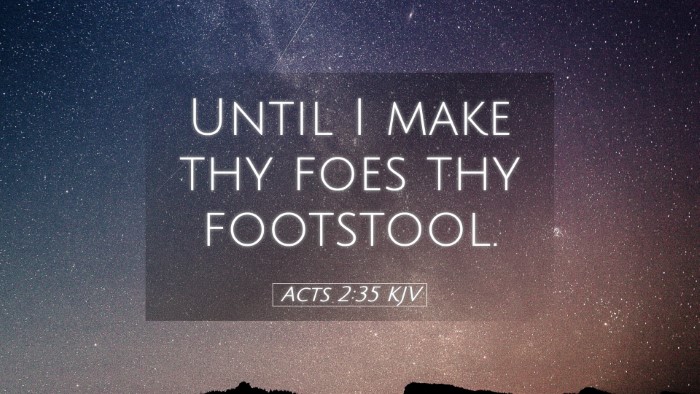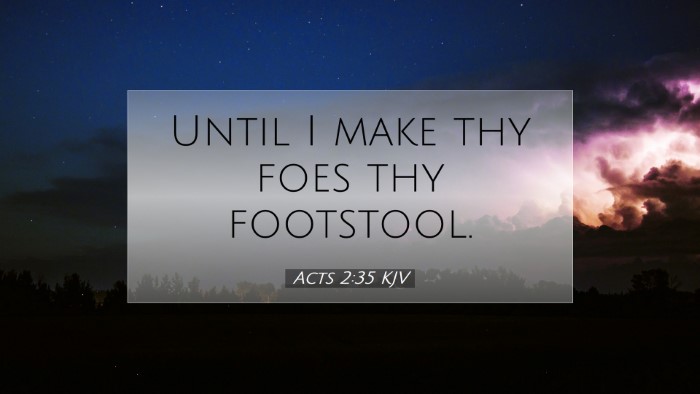Commentary on Acts 2:35
Acts 2:35 states:
"Until I make your enemies a footstool for your feet."
Introduction
This verse comes from Peter’s sermon on the day of Pentecost, where he quotes Psalm 110:1 to underline the exaltation of Jesus Christ. Understanding this verse requires a deep dive into its theological implications, its prophetic nature, and its role in the narrative of the early church. We draw insights from notable public domain commentaries to unpack this rich text.
Theological Significance
1. The Exaltation of Christ
The phrase "Until I make your enemies a footstool for your feet" emphasizes the sovereign rule of Christ. According to Matthew Henry, this signifies not only Christ's authority over His enemies but also His victory through His resurrection and ascension. Henry notes that this victory is both present and future, indicating that all authority has been granted to Jesus, and ultimately, all will recognize His lordship.
2. The Nature of Christ’s Kingdom
Albert Barnes expounds on the idea that the enemies being subjected to Christ is not merely a physical dominion, but rather a spiritual one. His kingdom is characterized by the gradual subjection of all opposing forces, as indicated throughout scripture. Any opposition will ultimately bow before Him, demonstrating the nature of Christ’s kingdom as one of peace and reconciliation.
Contextual Analysis
1. Peter's Sermon
In the context of Acts 2, Peter reflects upon Jesus’ life and ministry, and by quoting Psalm 110:1, he links the Old Testament prophetic promise of the Messiah to Jesus’ ministry. Adam Clarke importantly remarks on this connection, asserting that the psalm itself is a pivotal messianic text, revealing Jesus as both King and Priest. This serves to solidify the identity of Christ to the Jewish audience present at Pentecost.
2. Jewish Expectations of the Messiah
Understanding the expectations surrounding the Messiah gives clarity to this verse. The Jews anticipated a political figure who would conquer their oppressors. However, as Clarke articulates, this verse highlights a broader conquest — the spiritual dominion over sin, death, and the spiritual forces contrary to God. This Whit Sunday sermon serves to recalibrate the Jewish understanding regarding the Messiah’s mission.
Applications for the Church
1. Assurance of Victory
For believers today, Acts 2:35 should serve as a source of comfort and assurance that Christ is actively reigning and that ultimate victory over evil is assured. Matthew Henry emphasizes that while Christians may face trials, knowing that Christ has been given authority can grant believers hope as they persevere in faith.
2. Call to Evangelism
Understanding that Christ's enemies will ultimately become His footstool compels Christians to engage in evangelism. Barnes notes that the Great Commission is not merely a suggestion but a mandate originating from Christ's established authority. As the church carries out its mission, it participates in the growth of Christ’s kingdom.
Historical Context
1. The Early Church’s Struggles
The early church faced persecution and conflict as they spread the gospel. Acts 2:35, when viewed in this light, becomes a profound reminder of the power and presence of Christ amidst adversity. Adam Clarke points out that the assurance of Christ’s lordship would encourage early Christians as they encountered opposition.
2. Fulfillment of Prophecy
This verse also serves as a testament to how God fulfills His promises. The early Christians, familiar with the prophecies, would see the connection between Jesus and the Messianic expectations that surrounded their faith. This connection substantiates the legitimacy of Peter's proclamation and affirms that Jesus is the awaited Messiah.
Conclusion
Acts 2:35 is a profound declaration regarding the sovereignty of Christ and His ultimate victory. Through the insights provided by Matthew Henry, Albert Barnes, and Adam Clarke, we gain a richer understanding of not only the immediate context of this verse but also its lasting implications for the church today. It challenges believers to recognize their King and to live in hope, knowing that they are part of a kingdom where Christ reigns supreme.
Further Reflection
As we meditate on Acts 2:35, may we allow the truth of Christ’s authority to inspire our faith and action within our communities. Let us continue to seek understanding and application of this scripture, always looking to the example of the early church as a guide for our own journey in faith.


